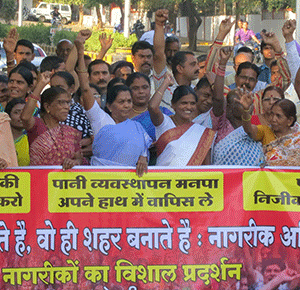I know firsthand the devastating effects of water privatization.
Soon after a World Bank-backed corporation took control of the water system in my city of Nagpur, India in 2011, my friend Nasrin’s water began to smell. A pipe leak had allowed sewage water to mix with her home’s drinking water. She started to see other families become sick from drinking the water, so Nasrin resorted to buying water at a steep mark-up from water tankers — tankers owned by the same private water corporation. Now she pays the corporation twice for her subpar water: once at the spigot, and once at the tanker. (This corporation, by the way, is a joint venture of Veolia, one of the world’s largest water corporations.)
Nasrin’s story is just one of many. Here in Nagpur, like everywhere else, corporate control of water has been a disaster. But what’s worse? The World Bank is now promoting my city’s privatization as a success story — to replicate in as many as 600 cities across India.
Mobilizing the grassroots
In January, I worked with people from Nasrin’s community and a coalition of 25 organizations to mobilize a wave of grassroots opposition. We formally invited the World Bank to visit Nagpur and hear our stories firsthand. The response? Silence.
We refuse to be ignored. We organized an international solidarity petition, and more than 750 organizations from countries all over the world joined our call. And a few weeks ago, I joined 200 of my fellow Nagpur residents outside local government offices to protest water privatization.
We will continue to take to the streets until the World Bank takes notice and responds to our demands.
We know we can win
One of Nasrin’s neighbors has resorted to slicing his rubber pipes to stop the meter from running up a bill for water he cannot drink. Still others have had no running water at all for five months. As one of Nasrin’s friends says, “Water doesn’t come, but the bills still do.”
As I said, I’ve seen firsthand the devastating impacts of water privatization. But I’ve also seen the impact that we have when thousands of people challenge water privatizers and their financial backers. Just last year, hundreds of thousands of people around the world rallied to protest the impending privatization of the water in Lagos, Nigeria. Thanks to the pressure people like you helped generate, the World Bank’s private investment arm dropped its water advisory contract with the Lagos government. And so far, together, we’ve held off the privatization of Lagos’ water.
That’s the power we have when we join our voices together.



